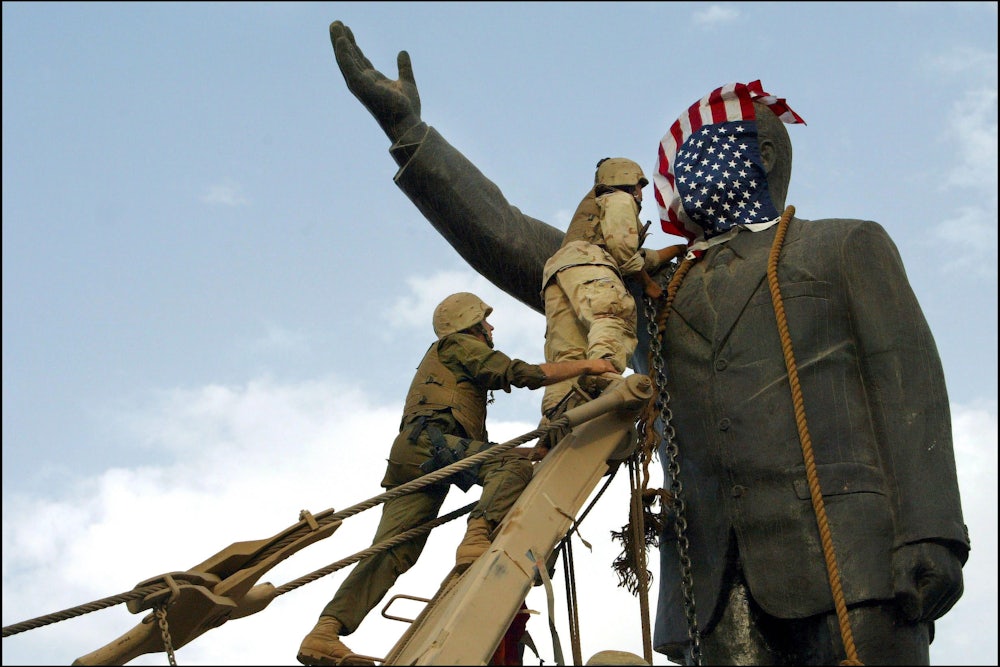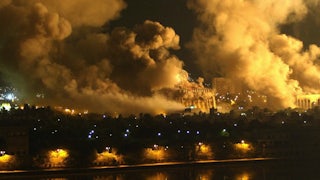The editor of this magazine asked me to write about the “debate at TNR about the war.” I thought he was referring to a current debate, but I couldn’t find anything on its pages. Then I realized he was talking about the time leading up to the invasion of Iraq on March 20, 2003—exactly 20 years ago today.
I was misled by the word “debate.” There actually wasn’t such a debate at the magazine.
The honchos at the magazine—editor in chief Martin Peretz, editor Peter Beinart, and literary editor Leon Wieseltier—were gung-ho about invading Iraq. They had had Iraqi dictator Saddam Hussein in their sights for a decade. I described to the current editor the opposition on the magazine at the time as being “me and the women”: namely, as I remembered it, Michelle Cottle, Sarah Wildman (both now at The New York Times), and Laura Obolensky. None of them spoke up at staff meetings, and I did so fitfully because it was a lost cause. I offered my dissenting opinion in columns for The American Prospect.
The magazine did run a “debate” on going to war in September 2002. They didn’t ask me to write. Instead, they chose philosopher Michael Walzer, a friend of Peretz, to issue a dissent. Walzer’s dissent was namby-pamby. He admitted that if the nuclear inspections (about which the Bush administration was predictably not serious) failed, then “many of us will probably end up, very reluctantly, supporting the war the Bush administration seems so eager to fight.”
Within Washington circles, The New Republic’s stand had considerable influence because of the magazine’s continuing reputation as a voice of liberal Democrats. The refrain was, “Even the liberal New Republic says so-and-so.” It was joined by The Washington Post’s editorial page and by the great majority of so-called policy experts, including Michael O’Hanlon and Kenneth Pollack at Brookings and Robert Kagan and Richard Perle and other members of William Kristol’s Project for a New American Century who hadn’t joined the Bush administration. The only notable exceptions I recall were Ivo Daalder at Brookings and Jessica Mathews at Carnegie, where I decamped in 2004 to write The Folly of Empire.
The magazine’s case for war rested on three pillars: first, the alleged threat posed by Iraq’s possession of weapons of mass destruction (a grab-bag term that included nuclear, chemical, and biological weapons), which, if not used by Saddam himself, could be handed off to terrorists; second, Saddam’s brutal dictatorship, which besides depriving his people of liberty and often life, set a bad example for the Middle East; and third, never explicitly stated, but certainly in the mind of the magazine’s editor in chief, the threat that Saddam’s Iraq posed to Israel. It was hoped that toppling Saddam would not only remove a threat to Israel but lead to a process of democratization in the Middle East.
In its reassessments of its position in 2004, the magazine acknowledged that the threat of WMD had been proven false. (Beinart, to his credit, commissioned Spencer Ackerman and me to write an investigative piece on how the administration had hoodwinked the public about the threat.) But the editors hung onto the second justification and perhaps the third. “If our strategic rationale for war has collapsed, our moral one has not,” the magazine editorialized in June 2004. In March 2013, reassessing the war 10 years after, Wieseltier wrote, “The Iraq war began wrongly and ended rightly.” He described it as “a war of democratization.”
This judgment, like the magazine’s assessment of the threat of WMD, has proved to be false. I am sure there are some, but I can’t think of a single good result of the war, and I can think of many bad ones besides the several hundred thousand dead. Democracy has certainly not come to the Middle East. Look at what has happened to Syria, Israel, Saudi Arabia, Iran (whose reform regime in the early 2000s was ousted after the Bush administration, eager to expand its conquests, rejected its peace offering), and Iraq itself. Touted as a democracy because it holds elections, it is plagued by corruption, deep and enduring sectarian divisions, powerful private militias allied to Iran’s Revolutionary Guard, and Iran’s overweening influence over its foreign affairs.
The memory of the invasion continues to plague American foreign policy efforts. Even today, America’s attempt to enforce what it calls a “rules-based” international order by repelling the Russian invasion of Ukraine is met by charges of hypocrisy. When Russian Foreign Minister Sergei Lavrov, speaking in New Delhi on March 3, accused the United States of “double standards” in condemning Russia’s invasion, his comparison was greeted, The Washington Post reported, with “loud applause” by an audience of academics, diplomats, and business executives.
In the Middle East, Iraq joined China and India in abstaining from the American-backed United Nations resolution condemning the Russian invasion. As a columnist for The Arab Weekly wrote, “the Kremlin’s broad legal justification for its use of force in Ukraine is the identical continuum of the precedent set by the US in Iraq 2003. The ghostly wrongs of Iraq 2003 have now come back to haunt the West as the Kremlin puts forward its legal justification based on the ‘pre-emptive principle’ first argued by the USA and its coalition in 2003.”
Washington has also proven reluctant to accept what were the obvious lessons of the Iraq War. The first is the strength of nationalism. In Iraq, the U.S. assumed that a country artificially constructed by Great Britain after World War I, composed of fractious religious and ethnic groups, and ruled over by an unpopular dictator would welcome an American liberating force. But in fact, the invasion awakened nationalist sentiments in the country. The U.S. had made the same mistake throughout its history—in the Philippines, in Cuba, and in Vietnam. Nationalism is not simply a rallying cry for a dictatorship but a deeply held set of sentiments that are based on a people’s desire to belong to an entity greater than themselves. That can fuel imperial ambition but also hyper-defensiveness about external threats and even competition.
The American government’s blindness to nationalism persists. When the U.S. authored the decision to expand NATO to Russia’s borders, withdrew from the anti-missile treaty, and supported Ukraine’s membership in NATO, it clearly underestimated Russia’s defensive nationalism, just as Russia clearly underestimated the Ukrainian reaction to its invasion. By abandoning its pledge of “strategic ambiguity” on the possibility of Taiwan rejoining China, the U.S. continues to underestimate China’s nationalism. Robert Wright, a former colleague at The New Republic, calls it part of our lack of “cognitive empathy.” As the invasion of Iraq showed, it can lead to utter disaster.
The second lesson we should have learned concerns a prudent realism in foreign affairs. It may be hard to imagine, but the U.S. might have been better off if Iraq and Iran had remained at odds, just as the U.S. would be better off now if it had not abandoned the nuclear treaty with Iran and had reestablished diplomatic relations. Similarly, the U.S. might be better off now not facing an alliance of even a weakened Russia with China. It’s probably too late to create distance between the countries—and I’m not arguing for withdrawing or reducing support for Ukraine—but I don’t think that the Biden administration had a clear understanding when it took office of the potential hazards that the conflict between Russia and Ukraine posed.
As for the magazine, The New Republic certainly suffered, as did other Washington institutions, a blow to its reputation from its support for the invasion of Iraq. But most of its liberal or left-wing readership that it once shared with The Nation had already departed by 2003, and in 2007–2008, the magazine was able to regain its cachet through its early coverage and support of Barack Obama. Since then, it has endured several changes in its ownership and staff that have removed, for the most part, any association with its stance on the Iraq War.
But I have to say that in Washington, the prevailing spirit of neo–Cold War evangelism, evidenced in the peremptory rejection of negotiation and the promise of imminent victory that underlay this magazine’s support in 2003 for the invasion of Iraq, is still with us. As someone who has supported Ukraine against the Russian invasion but has remained skeptical about a military victory against the Russians, I have sometimes felt much as I did in that year before the invasion of Iraq—to quote Bob Dylan, “Stuck inside of Mobile with the Memphis Blues again.”






